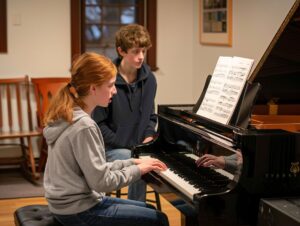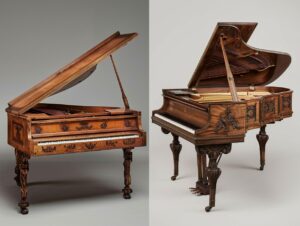The question of when to start piano lessons is common for young aspiring pianists. However, the answer isn’t simple. Many factors influence the decision, such as maturity level, interest in music, and ability to focus.
Experts recommend starting between 5 and 8 years old. This age range is best because children have developed motor skills and cognitive abilities for playing the piano. Plus, they are more willing to learn and have longer attention spans than younger kids.
Age is an important factor, but other things matter too. Individual readiness and desire to learn should also be considered. Some children may be ready and proficient before reaching the suggested age range.
Pro Tip: Introduce music to your child early. Get them listening to classical music or attending concerts. This can help them develop a love for music.
Start piano lessons early and you may miss out on becoming the next Mozart. But you’ll get ahead in impressing your parents and annoying your neighbors!
Benefits of Learning Piano at a Young Age
Learning piano at an early age brings numerous benefits that develop a child’s character. It boosts cognitive abilities, hones motor skills, and reinforces discipline and perseverance.
- 1. Cognitive gains from learning piano as a kid are immense. Studies show that playing the piano activates brain function, enhancing memory and problem-solving skills.
- 2. Piano lessons aid in building fine motor skills in children. This complex instrument needs exact finger movements and coordination, helping them refine their dexterity and hand-eye coordination.
- 3. Learning piano instills discipline and perseverance in young learners. Regular practice sessions set a routine, teaching kids the value of commitment and hard work for reaching their goals.
In addition, playing the piano at a young age provides special advantages such as increased emotional expression and stress relief. The capability to express oneself through music lets children connect with their emotions on a deeper level.
To gain these incredible benefits for your kid’s growth, it’s essential to start their piano journey early. Catch this chance before they miss out on the cognitive, motor skill, and discipline advantages that come with learning piano at a young age. Seize the potential for improvement and enrichment in their lives by signing them up for piano lessons now!
But before you dive in, think about if you’re ready to hear ‘Chopsticks’ from your kid every waking hour—because that’s what you’re in for.
Factors to Consider Before Starting Piano Lessons
For little ones, the ideal age to begin piano lessons is usually 6-7 years old. But, if they show signs of readiness and genuine passion, it may be appropriate to start earlier! Ensure your child is willing to commit to the necessary time and effort before starting. Plus, consider resources like a suitable piano or keyboard for practice, and a qualified teacher to guide them.
Once upon a time, piano lessons were only accessible to the wealthy elite. But, now millions of individuals of all ages embark on their musical journey with lessons. Parents can ensure their child receives the best opportunity for success by considering factors such as age, commitment level, and available resources. So, don’t wait – let them get started on their musical journey with the keys, even if they need a booster seat!
Choosing the Right Age to Start Piano Lessons
Picking the correct age for piano lessons needs careful thought. Here are 3 key points to help you make this big choice:
- Physical readiness: Kids should have enough motor skills and finger control to operate the piano keys easily. This usually appears when they are 6 or 7.
- Cognitive development: Piano lessons need concentration, memory, and the capacity to get musical ideas. Kids who are 8 or 9 usually have these skills.
- Motivation and interest: It is essential that your kid has genuine enjoyment in learning the piano. Beginning too soon could lead to disappointment and apathy, while starting too late could hold back progress.
Take into account special details like your child’s musical ability, exposure to music at an early age, and their general maturity level. Keep in mind that these factors might affect when your child is ready to begin their musical journey.
It’s time to act! Don’t let your kid miss out on the great benefits that piano lessons can bring. Give them a lifelong energy for music and self-expression by selecting the right age to start their piano lessons. Rely on your instinct, consult with experts if needed, and embrace this amazing opportunity for their personal growth.
Piano lessons may not fix your poor sense of rhythm, but at least you’ll have an explanation when you trip over your own two feet while dancing.
Preparing for Piano Lessons
To ensure a successful start to piano lessons, take these key steps:
- Set up a comfortable, distraction-free practice space
- Gather sheet music, a metronome, and a notebook
- Set specific goals for yourself
- Create a consistent schedule
- Find a qualified instructor with the right learning style
- Stay motivated and dedicated
Remember why you started playing and celebrate small wins! With these tips, you’ll be ready to embark on a musical journey full of joy and fulfillment.
Finding an ideal piano teacher is no easy feat – you need one with music qualifications and a tolerance for children with sticky fingers!
Finding a Suitable Piano Teacher
Sarah, a young aspiring pianist, was looking for the perfect piano teacher to take her music journey to the next level. Prioritizing qualifications and experience was her first step. She desired someone who possessed the necessary educational background and expertise.
She also needed to consider the teacher’s teaching style and methods. A good piano teacher should be flexible and able to accommodate each student’s individual learning needs, while also fostering creativity and joy in the process.
Furthermore, an excellent rapport and communication is key. It’s vital to establish a positive relationship with your piano teacher in order to achieve effective learning. Thus, Sarah took the time to find someone with whom she could connect.
Additionally, she asked around for recommendations from reliable sources such as music schools and other musicians. These networks helped her narrow down her search. In the end, she found the perfect teacher: Mr. Johnson, a renowned pianist known for his unique teaching methods. Under his guidance, Sarah blossomed into a remarkable musician, gaining not only technical skills but also confidence in her abilities.
So, when you’re ready to embark on your musical journey, remember: it’s never too early to start practicing…unless you’re still in the womb, in which case your mom might have some objections.
Developing a Practice Routine
- Set goals – decide what you want to achieve with your piano playing. Have a plan to stay focused and motivated.
- Schedule practice – be consistent and make time for piano practice in your day or week. Make it a habit.
- Warm-up – use warm-up exercises before playing to avoid injury and help technique.
- Break it down – divide the music or concept into sections. Master one at a time.
- Practice skills – include exercises to target specific techniques, like scales, arpeggios, finger exercises, sight-reading, and improvisation.
- Reflect and evaluate – take time to think about what went well and what to improve. Know your strengths and weaknesses.
- Remember – regular practice is better than marathon sessions.
- Record yourself – self-assessment and tracking progress over time.
- Bottom line – be prepared for fingers-wiggling frustration and searching for sheet music!
Conclusion
It’s essential to realize that some kids may be extraordinary at music from a young age, while others may need more time. So, no one answer works for everyone.
Also, it’s recommended to talk to piano teachers or music experts who can judge a child’s readiness for formal classes. They can provide helpful advice based on their experience with growing musical talent.
Moreover, presenting music ideas and fundamental piano skills through activities and games may be good for children as young as three. This informal exposure can create a base for future formal lessons.
In agreement with these considerations, research by the Royal Conservatory of Music proposes that starting piano lessons at around six or seven is best for most kids. This study speaks to the value of balancing early introduction and readiness for a positive learning experience.
Finally, the decision about when to start piano lessons should prioritize the kid’s individual development and love for music. By considering this decision carefully and all the relevant factors, parents can give their children a fulfilling musical journey that fits with their special abilities and interests.
Frequently Asked Questions
1. At what age should a child start piano lessons?
The ideal age to start piano lessons can vary depending on the child, but most music teachers recommend starting between the ages of 5 and 8. At this stage, children have developed enough motor skills and concentration to begin learning piano basics.
2. Can my child start piano lessons at a younger age?
While it is possible for children as young as 3 or 4 to start piano lessons, it may be more challenging for them to fully grasp the concepts and techniques. It’s important to consider their attention span, ability to sit still, and readiness to learn before starting at such a young age.
3. Is it too late to start piano lessons as an adult?
No, it is never too late to start learning the piano as an adult. Many adults successfully learn to play the piano and enjoy the benefits of music education. It may take some extra time and practice, but with dedication, progress can be made at any age.
4. How long should a piano lesson be for beginners?
For beginners, piano lessons typically last between 30 minutes to an hour. The duration may depend on the age and attention span of the student. It’s important to have enough time to cover all the necessary concepts and allow for practice during the lesson.
5. Can my child start with an electronic keyboard instead of a piano?
Starting with an electronic keyboard is a common and practical choice for beginners, especially children. Keyboards are more affordable, portable, and offer various sound options. However, it’s important to transition to an acoustic piano as the student progresses to develop proper technique and touch.
6. How often should piano lessons be taken?
The frequency of piano lessons may vary depending on the individual and their commitment. Generally, beginners benefit from weekly lessons to maintain consistency and progress. As they advance, some students may choose to have lessons bi-weekly or monthly, adjusting to their needs and progress.



